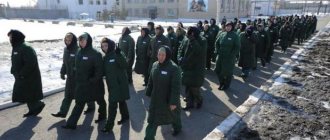Criminal amnesty 2021
For anyone interested in amnesty in the Russian Federation, the news is disappointing. The last time a criminal amnesty was held was in 2015, it was timed to coincide with the 70th anniversary of the victory in the Great Patriotic War. However, since then the decision to hold an amnesty has no longer been seriously considered.
Amnesty means a measure adopted and confirmed by a decision of the relevant government authority in relation to individuals who have committed a crime. This measure may imply the full or partial release of the prisoner, or a change in the form of his punishment to a more lenient one. The decision to grant amnesty most often affects a specific age group or a group defined by gender.
For example, categories of the population such as pregnant women, minors, and the elderly may be eligible for a criminal amnesty. It is worth noting right away that these individuals should be sentenced to short sentences for minor crimes.
In 2021, the Federal Penitentiary Service proposed a potential criminal amnesty due to the rapidly deteriorating epidemiological situation due to coronavirus, but the State Duma of the Russian Federation rejected this initiative.
In 2021, State Duma deputies several times proposed carrying out an act of humanism. The last time such an initiative was taken was in the spring by Ombudsman Tatyana Moskalkova. An amnesty is unlikely to take place in December 2021, sources say. There is simply no time left to adopt the corresponding decree. The pandemic that disrupted 2020 also continues.
List of main features of amnesty according to the Criminal Code of the Russian Federation
The main feature of the amnesty according to the Criminal Code of the Russian Federation is that it is carried out in relation to a certain circle of persons united according to any characteristic, while persons must be convicted only under “light” articles of the Criminal Code.
The decision on amnesty can be made by a strictly separate resolution of the State Duma, which has undergone preliminary consideration.
At the same time, amnesty can be characterized by completely different forms, for example, complete release from punishment, partial release, release from additional punishment, changing the conditions of punishment to more lenient ones. However, in any case, persons who have committed a serious crime will not be able to count on amnesty. The reason for making a decision on amnesty is a memorable or significant date in the history of the state.
Criminal amnesty in 2021 - 2022
Criminal law first appeared in Russia at the beginning of the 19th century, when it was specifically separated from the general code of laws of the Russian Empire.
At that time, the Criminal Code included 765 articles that defined the general features and characteristics of various types of crime violations, provided a more detailed description of the nature of the crime, the rules for determining the potential punishment for each of the offenses, as well as an algorithm for canceling punishment in the event of an unfair punishment.
It is worth noting that the Russian Empire was one of the first to separate the Criminal Code and law into a separate branch of legislation, which was a significant progress in the state system of that time, allowing it to significantly outstrip neighboring states.
Before moving on to a criminal amnesty in 2021-2022, we should consider the immediate definition of this term. It is worth noting right away that the widespread opinion that pardon and amnesty are the same thing is incorrect.
Prisoners in Russia have been waiting for a criminal amnesty for several years
The Russian Ombudsman proposed an amnesty for prisoners who committed minor crimes
A criminal amnesty in Russia may be announced before the New Year in December 2021. This statement was made by an expert in an interview with Gorodskiye Vedomosti, criminal lawyer Roman Savitsky. The lawyer believes that the president could take such a step before a big holiday, releasing people with criminal records for crimes of minor and medium gravity. This way, prisons will be able to reduce their population and reduce the risk of coronavirus infection among the remaining prisoners.
Amnesty for the 75th anniversary of the Victory in 2021 (text of the resolution)
- Entrust the application of the Resolution of the State Duma of the Federal Assembly of the Russian Federation “On declaring an amnesty in connection with the 70th anniversary of Victory in the Great Patriotic War of 1941-1945” (hereinafter referred to as the Amnesty Resolution):
- The release of convicts from additional types of punishment that were not executed on the day the amnesty resolution came into force is entrusted to institutions and bodies considering the issue of releasing convicts from the main type of punishment.
- The decision to apply the amnesty act is made in relation to each person individually. In the absence of the necessary information about this person, consideration of the issue of applying the amnesty act is postponed until additional documents are received.
- Institutions and bodies entrusted with the implementation of the Amnesty Decree have the right to request from the relevant institutions the documents necessary to make a decision on the application of the amnesty act. Such requests are executed immediately.
- Resolutions on the application of the amnesty act adopted by correctional institutions, pre-trial detention centers, penal inspections, internal affairs bodies of the Russian Federation, investigative bodies, the command of military units and the command of disciplinary military units are approved by the prosecutor, adopted by the preliminary investigation bodies - the head of the investigative body, accepted by bailiffs - senior bailiff. From the date of approval of these decisions, the serving of the sentence or the criminal proceedings are terminated.
- The Amnesty Decree covers persons who committed crimes before the day it came into force, and convicts serving their sentences on the territory of the Russian Federation.
- Explain that when applying the amnesty act:
- Paragraph 2 of the Amnesty Decree applies to convicts who have not previously served imprisonment and who committed intentional crimes under the age of 18, for which a punishment exceeding five years of imprisonment is provided.
- The part of the sentence provided for in subparagraphs 1 and 2 of paragraph 10 of the Amnesty Resolution is calculated on the day it enters into force.
- The amnesty act does not apply to persons convicted of a combination of crimes, if one of them is provided for in paragraph 13 of the amnesty resolution.
- Persons convicted of a combination of crimes for the first time and falling under paragraphs 1 - 3 of the Amnesty Decree may be released from serving their sentence if the total term of the sentence imposed on them does not exceed five years of imprisonment.
- Persons subject to the Amnesty Decree are not exempt from administrative penalties, as well as from the obligation to compensate for damage caused as a result of unlawful actions committed by them.
- When applying an amnesty act in relation to persons whose sentence was reduced by pardon or in accordance with an amnesty act, one should proceed from the term of punishment established by the relevant acts. Application of an amnesty act is permitted on no more than one basis.
- In accordance with paragraph 10 of the Amnesty Resolution, the part of the sentence that has not been served on the day the Amnesty Resolution enters into force is subject to reduction. This clause applies to convicted persons whose sentences entered into legal force before the day the amnesty resolution came into force.
- The restrictions established for convicts by paragraph 13 of the Amnesty Resolution also apply to suspects and accused, cases and materials in respect of which are being processed by the inquiry authorities, preliminary investigation authorities and courts.
- When applying the amnesty act, the following are not taken into account:
- In accordance with subparagraph 5 of paragraph 13 of the Amnesty Resolution, the amnesty act does not apply to persons who have a criminal record or whose criminal record has been withdrawn or expunged, after 2005 who were released from punishment by way of pardon or in accordance with resolutions of the State Duma of the Federal Assembly of the Russian Federation:
- The provisions of paragraph 17 of this Resolution do not apply to persons who were previously released from punishment in accordance with acts of pardon or amnesty adopted by other states.
- The following should be considered as malicious violators of the established procedure for serving a sentence when applying an amnesty act:
- Materials on the application of the amnesty act to convicts serving their sentences, who have been prescribed medical measures in the form of treatment for alcoholism, drug addiction, toxicomania, active form of tuberculosis, venereal disease in the prescribed manner, are considered after the said convicts have completed compulsory treatment.
- To propose to the Government of the Russian Federation:
- If the question of applying an amnesty act arises after six months from the date of entry into force of the Amnesty Resolution, it is executed in the manner prescribed by paragraph 1 of this Resolution.
- This Resolution comes into force on the date of its official publication.
1) for correctional institutions and pre-trial detention centers - in relation to those sentenced to imprisonment, the sentences in whose cases have entered into legal force. Execution of the Resolution of the State Duma of the Federal Assembly of the Russian Federation “On declaring an amnesty in connection with the 70th anniversary of Victory in the Great Patriotic War of 1941-1945” (hereinafter referred to as the Resolution on Amnesty) in relation to these convicts is carried out according to a resolution approved by the prosecutor of the head of the correctional institution or the head of the investigative insulator. The decision on the application of the amnesty act is accompanied by the personal file of the convicted person, a certificate of incentives and penalties, and other necessary documents;
2) to the bodies of inquiry and bodies of preliminary investigation - in relation to suspects and accused whose cases and materials about crimes are being processed by these bodies;
3) to the courts:
in relation to persons whose cases of crimes are being processed by the courts and have not been considered until the day the amnesty resolution comes into force, as well as in relation to persons whose cases of crimes have been considered, but court sentences have not entered into legal force;
in relation to conditionally sentenced and convicted persons, the serving of their sentence is suspended in cases and in the manner provided for by the legislation of the Russian Federation, with the exception of convicted persons, the serving of their sentence is postponed in accordance with Article 821 of the Criminal Code of the Russian Federation. The issue of applying an amnesty act in relation to these convicts is decided by the court on the proposal of the penal inspections exercising control over their behavior, and in relation to convicted military personnel - on the proposal of the command of military units;
in relation to convicts for whom, before the date of entry into force of the Amnesty Resolution, the unserved part of the sentence was replaced with a more lenient type of punishment. The issue of applying an amnesty act in relation to these convicts is decided by the same court that issued a decision to replace the unserved part of the sentence with a more lenient type of punishment;
4) to penal inspections - in relation to persons serving sentences in the form of compulsory labor, correctional labor, restriction of freedom, deprivation of the right to hold certain positions or engage in certain activities;
5) for bailiffs - in relation to those sentenced to a fine, if the fine is not collected before the day the amnesty resolution comes into force;
6) to the internal affairs bodies of the Russian Federation - in relation to those sentenced to imprisonment who are not in custody, the sentences in whose cases have entered into legal force;
7) to the command of military units - in relation to military personnel sentenced to restrictions on military service; to the command of disciplinary military units - in relation to military personnel sentenced to detention in a disciplinary military unit.
1) subparagraphs 1 - 3 of paragraph 1 of the Amnesty Resolution include convicts belonging to the categories of veterans specified in Articles 2 - 4 of the Federal Law of January 12, 1995 No. 5-FZ “On Veterans”;
2) subparagraph 4 of paragraph 1 of the Amnesty Resolution includes persons awarded state awards of the USSR, established by Decree of the Presidium of the Supreme Soviet of the USSR of July 3, 1979 No. 360-X “On approval of the General Regulations on orders, medals and honorary titles of the USSR”, and persons awarded state awards of the Russian Federation established by Decree of the President of the Russian Federation of September 7, 2010 No. 1099 “On measures to improve the state award system of the Russian Federation”;
3) subparagraph 5 of paragraph 1 of the Amnesty Resolution includes persons who committed an intentional crime under the age of 18, for which a punishment not exceeding five years of imprisonment is provided;
4) the main document confirming that the convicted person took part in the liquidation of the consequences of the Chernobyl nuclear power plant disaster or suffered from exposure to radiation as a result of this disaster (subparagraph 6 of paragraph 1 of the Amnesty Resolution) is a certificate issued on the basis of the Law of the Russian Federation of May 15, 1991 No. 1244-I “On the social protection of citizens exposed to radiation as a result of the disaster at the Chernobyl nuclear power plant” and Decree of the Government of the Russian Federation of December 21, 2004 No. 818 “On federal executive authorities authorized to determine the procedure and conditions for the registration and issuance of certificates to certain categories of citizens from among persons exposed to radiation as a result of the disaster at the Chernobyl nuclear power plant, and citizens from special risk units”;
and discharges of radioactive waste into the Techa River”, the provisions of the Law of the Russian Federation of May 15, 1991 No. 1244-I “On the social protection of citizens exposed to radiation as a result of the disaster at the Chernobyl Nuclear Power Plant” have been extended;
6) the effect of subparagraph 6 of paragraph 1 of the Amnesty Resolution also applies to convicts who have been issued relevant documents on the basis of similar legislative and other regulatory legal acts of other states - former union republics of the USSR;
7) subparagraph 7 of paragraph 1 of the Amnesty Resolution includes women who have not been deprived of parental rights and who have children who are under 18 years of age on the day the Amnesty Resolution enters into force, as well as children who are recognized as in accordance with the established procedure, disabled if they became disabled before reaching the age of 18; women who are pregnant on the day of the decision to apply the amnesty act;
 Subparagraph 8 of paragraph 1 of the Amnesty Resolution covers men who have not been deprived of parental rights, have not remarried and are the only parents of children who are under 18 years of age on the day the Amnesty Resolution enters into force, as well as children who, before the entry into force by virtue of the Amnesty Decree, they are recognized as disabled in the prescribed manner if they became disabled before reaching the age of 18 years;
Subparagraph 8 of paragraph 1 of the Amnesty Resolution covers men who have not been deprived of parental rights, have not remarried and are the only parents of children who are under 18 years of age on the day the Amnesty Resolution enters into force, as well as children who, before the entry into force by virtue of the Amnesty Decree, they are recognized as disabled in the prescribed manner if they became disabled before reaching the age of 18 years;
9) subparagraph 9 of paragraph 1 of the Amnesty Resolution includes men who are 55 years old on the day the Amnesty Resolution comes into force, and women who are 50 years old on the day the Amnesty Resolution comes into force, and in the absence of documents confirming the day and month of birth - men born before 1960 and women born before 1965;
10) subparagraph 10 of paragraph 1 of the Amnesty Resolution includes persons recognized in the prescribed manner as disabled people of group I or II before the date of entry into force of the Amnesty Resolution; persons with an active form of tuberculosis, assigned in the prescribed manner to group I or II of dispensary registration, persons with oncological diseases of clinical group III or IV, on the day the decision was made to apply the amnesty act.
1) criminal records expunged or expunged in accordance with the procedure established by law. Persons whose criminal record has been cleared or expunged are considered to have committed a crime for the first time;
2) convictions for crimes for which liability is not provided for by the Criminal Code of the Russian Federation;
3) convictions for crimes previously committed through negligence, regardless of the type of punishment;
4) convictions for intentional crimes for which penalties other than imprisonment were imposed;
5) convictions for crimes for which the punishment was imposed conditionally or with a deferment of serving the sentence or execution of the sentence, if subsequently the convicted person was not sent to a place of imprisonment to serve the assigned sentence;
6) criminal records of persons who served their sentences outside the territory of the Russian Federation.
1) dated April 19, 2006 No. 3043-IV GD “On declaring an amnesty in connection with the 100th anniversary of the establishment of the State Duma in Russia”;
2) dated September 22, 2006 No. 3498-4 GD “On declaring an amnesty for persons who committed crimes during the period of counter-terrorism operations in the territories of the constituent entities of the Russian Federation located within the Southern Federal District”;
3) dated July 2, 2013 No. 2559-6 State Duma “On declaring an amnesty”;
4) dated December 18, 2013 No. 3500-6 GD “On declaring an amnesty in connection with the 20th anniversary of the adoption of the Constitution of the Russian Federation.”
1) convicts in respect of whom a corresponding decision has been made by the head of the correctional institution. If the period of validity of the disciplinary sanction, which served as the basis for recognizing the convicted person as a persistent violator of the established procedure for serving the sentence, expires during the period of execution of the Amnesty Resolution, the convicted person ceases to be considered a persistent violator. This condition also applies to early withdrawal of the corresponding penalty as an incentive;
2) convicts held in colony settlements and sent to correctional colonies of other types, if after the judge’s decision to send these convicts to correctional institutions, they served less than one year of imprisonment on the day the amnesty resolution came into force;
3) convicts for whom a non-custodial sentence for malicious evasion from serving a sentence has been replaced by imprisonment;
4) convicts who again committed intentional crimes before the sentence entered into legal force and the beginning of the calculation of the term of serving the sentence or who committed intentional crimes while serving the sentence;
5) convicts who committed intentional crimes during the probationary period established by the court, during the period of deferment of serving the sentence or during the remaining unserved part of the sentence after the application of parole to them or the replacement of the unserved part of the sentence with a more lenient type of punishment;
6) convicts whose conditional sentence, parole or deferment of serving a sentence was revoked by the court, if after the court decision was made to send these convicts to correctional institutions, they served less than one year of imprisonment on the day the amnesty resolution came into force.
The basis for recognizing the convicted person as having completed the course of treatment is the conclusion of the medical commission on the cessation of the application of these measures.
Materials on the application of the amnesty act to convicts with an active form of tuberculosis, assigned in the prescribed manner to group I of dispensary registration, are considered after the said convicts have completed an intensive course of treatment and they have stopped bacterial excretion, confirmed by a medical report.
To organize the necessary medical care for those released from places of deprivation of liberty, patients with an active form of tuberculosis, assigned in the prescribed manner to group I or II of dispensary registration, patients with oncological diseases of clinical group III or IV, correctional institutions must immediately notify the relevant local government bodies and health authorities about release of these persons.
1) take, together with the executive authorities of the constituent entities of the Russian Federation, measures to ensure employment and living arrangements for persons released from places of imprisonment, as well as their medical care;
2) maintain the staffing level of penal inspections for one year from the date of expiration of the deadline for execution of the Amnesty Resolution.
A similar proposal was made by the Commissioner for Human Rights in Russia, Tatyana Moskalkova.
“It is important that those who do not pose a great danger to society do not have a criminal record. - said Tatyana Moskalkova. — Crimes of minor and medium gravity should entail punishment, but not a criminal record, because it does not provide an opportunity to get a job or take out a loan. Perhaps it makes sense to hold an amnesty to expunge a criminal record for such people.”
The ombudsman also motivated her proposal by the fact that “many people have already served their sentences, and their criminal record hangs on them like chains.” But one of the main arguments of such an amnesty is that employers are extremely reluctant to consider people with a criminal record as candidates for open jobs. “A criminal record is a wall that a person cannot break through,” Moskalkova emphasized.
Amnesty has been held regularly in Russia since 1856. There was no fixed period between acts of humanitarianism. They took place twice in 1924. In 1957, the autumn amnesties were separated by about a month. It was announced twice in 2006.
Will an amnesty be announced in 2021?
It was assumed that the government would issue a corresponding decree in 2020. The amnesty was planned to coincide with the 75th anniversary of the Victory. But the coronavirus pandemic prevented the project from being implemented. The epidemiological situation in prisons became one of the reasons for the repeated proposal for an amnesty. But the FSIN initiative was not supported by the government.
In 2021, State Duma deputies several times proposed carrying out an act of humanism. The last time such an initiative was taken was in the spring by Ombudsman Tatyana Moskalkova. An amnesty is unlikely to take place in December 2021, sources say. There is simply no time left to adopt the corresponding decree. The pandemic that disrupted 2020 also continues.
Should we expect a criminal amnesty in 2022 in Russia?
There is already active debate about whether a criminal amnesty will be held in 2022. Of course, if this happens in 2021, then you shouldn’t expect a repeat of the initiative in 2022. However, now an increasing number of people are inclined to believe that such a decision should not be expected in 2021, since the announcement of a future amnesty is carried out long before its adoption.
2021 is almost over, but there are no concrete decisions in this direction. In addition, the current epidemiological situation is not conducive to such significant population movements.
Another problem may be the fact that at the moment there are no significant dates in honor of which an amnesty could be held.
The media do not rule out the possibility of mass releases next year. They may be timed to coincide with the 105th anniversary of the October Revolution.
The State Duma has not yet announced plans to hold another amnesty. In the coming years there will also be round dates for her. Thus, in 2023, Russia celebrates the 30th anniversary of the Constitution.
High-profile cases of pardon
Cases of pardoning individuals were widely covered in the media at one time:
- 1997 President Boris Yeltsin signed an act of pardon for former diplomat Vladimir Makarov, recruited by American intelligence back in Soviet times. The former adviser to the Ministry of Foreign Affairs was sentenced to 7 years in prison. The President granted Vladimir Makarov freedom.
- 2010 President D. Medvedev signed an act of pardon for three citizens: Alexander Zaporozhsky, Sergei Skripal, Igor Sutyagin. All three were charged with treason. The president’s decision was somewhat forced: the criminals were exchanged for ten Russian intelligence officers who had been detained a month before the decision was made in the United States. Among them was the famous Anna Chapman.
- 2017 President V. Putin, by force of his decree, pardoned Oksana Sevastidi, accused of high treason.
Is Putin for amnesty or not?
In 2021, President of the Russian Federation Vladimir Putin initiated the May amnesty, which included the following categories of citizens: pensioners, pregnant women, disabled people, minors, military personnel, police officers, victims of the Chernobyl disaster.
At the same time, to be included in the list of persons subject to amnesty, certain conditions must be met, namely, the period of restriction of freedom should not exceed 5 years, moreover, this should be the first imprisonment for a citizen. In addition, citizens who participated in organizing riots and attacks on police will not be able to count on amnesty.
This resolution was unanimously adopted by the State Duma of the Russian Federation, although the consideration of this document took 2 plenary meetings. According to rough estimates, such an amnesty will allow the release of 3-3.5 thousand people from places of detention.
What to expect for those sentenced to maximum security
When the law on amnesty comes into force, those convicted of serious and especially serious offenses will not be able to expect release. There are no exceptions to the rules. This point is described in Art. 15 of the Criminal Code of the Russian Federation. Grave are considered intentional acts, for which the maximum penalty does not exceed 10 years of imprisonment, or careless acts, for which a penalty of no more than 15 years of imprisonment is provided. Crimes that are punishable by imprisonment for more than 10 years are considered especially serious.
On a note!
You should not expect that the amnesty will affect repeat offenders and persons who violate the order and regime in correctional institutions or who have committed a crime in places of deprivation of liberty.
Those incarcerated and their families are hoping for speedy passage of the long-awaited law so they can be released early. It remains to be expected that the State Duma and the President will make an appropriate decision.







